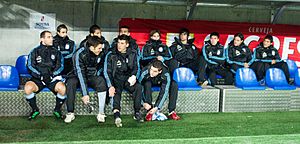Substitute (association football) facts for kids
In association football, a substitute is a player who comes onto the field during a game. They replace another player who is already playing. This change is called a "substitution." It helps teams keep their players fresh and strong throughout the match.
Contents
Why Do Teams Use Substitutes?
Teams make substitutions for several important reasons. One common reason is to replace a player who is injured or very tired. Playing a full football match can be very demanding, so fresh players can help keep the team's energy up.
Substitutions can also be made for tactical reasons. A coach might bring on a new player to change the team's playing style. For example, if a team needs to score a goal, they might replace a defender with an extra striker. If they want to protect a lead, they might bring on another defender. Sometimes, a player might not be playing their best, so a coach will substitute them for someone else.
How Many Substitutes Are Allowed?
The rules for substitutions can change slightly depending on the league or competition. In most professional football matches, teams are allowed to make a certain number of substitutions, usually three to five. In some youth or friendly games, more substitutions might be allowed. Once a player has been substituted off the field, they usually cannot come back into the game.
What is a "Super-Sub"?
The term "super-sub" is used for a substitute player who comes into the game and makes a huge positive impact. This often means they score an important goal, especially late in the match. These goals can help their team tie the game or even win it.
Some famous "super-subs" in football history include:
- David Fairclough for Liverpool
- Adam Le Fondre for Reading
- Ole Gunnar Solskjær and Javier Hernández for Manchester United
- Edin Džeko for Manchester City
These players became well-known for their ability to change the outcome of a game after coming off the bench.
Images for kids
-
The assistant referee indicating a substitution
 | Anna J. Cooper |
 | Mary McLeod Bethune |
 | Lillie Mae Bradford |



